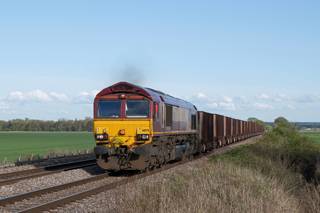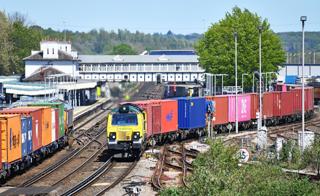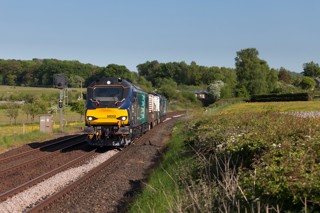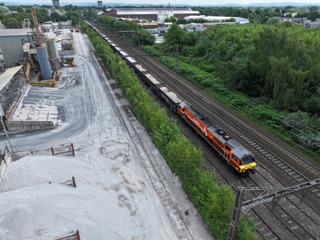Looking back over the year we’ve just had, together with the disheartening (though not unexpected) way that 2021 has begun, there is the very real risk that we could lose sight of our longer-term goals. This applies to us all personally, as well as to our industry and the country. When you’re fighting today’s fires, worrying about what tomorrow will bring is neither easy nor straightforward.
Eurostar’s terrible plight is a prime example (see pages 6-7). We’ve all known for months that it could never withstand a 95% fall in passenger numbers without help. But since the latest lockdown imposed in January, the passenger business has slumped further - 99% has now evaporated. There is currently just a single daily train leaving St Pancras International for Paris, Brussels and Amsterdam. One. Daily. Train.
It’s blindingly obvious that no business can survive a near 100% collapse in its income, without significant help. Yes, Eurostar has benefited from the UK Government-funded furlough scheme to pay 80% of staff wages, but it has not been eligible for any other Government support and time is running out. Eurostar has warned that without urgent additional funding, this is an existential crisis.
Government confirmation on January 16 of yet more financial backing for aviation has thrown another welcome lifeline to this devastated sector - but, as I write, no comparable help has been offered to safeguard Eurostar’s very existence. The complex and far-reaching consequences of not protecting the service on which nearly three-quarters of ALL London to Paris journeys are made are covered in News. But I do want to put one consequence in particular into the sharpest of focus.
Just weeks before all our lives were up-ended last March, Prime Minister Boris Johnson said at a conference: “As a country, as a society, as a planet and as a species, we must now act.”
The PM was talking about climate change at a gathering discussing the upcoming COP26 (the UN’s Climate Change Conference), originally due to take place in Glasgow, last November. It was inevitably postponed for a year because of COVID. Its aim is to “unite the world to tackle climate change”.
In response, Sir David Attenborough commented: “It is up to us to organise the nations of the world to do something about it. That is why it is so encouraging to know that the present government has devoted this year to it.”
Neither could have guessed that 2020 would instead become consumed by a global pandemic. But the long-term need to tackle climate change is now even more desperate. The UK’s target to achieve net zero carbon emissions by 2050 is unchanged, but becoming ever more difficult to achieve. Allowing Eurostar to collapse would be an enormous environmental setback, forcing passengers onto more polluting airlines - the same airlines whose survival has been aided by emergency taxpayer funding currently denied to the much greener Eurostar.
Not only would Eurostar’s collapse send a terrible international message in terms of climate change, it would also bring significant challenges to High Speed 1, which receives 88% of its income from track access charges (including from Eurostar). Incidentally, in October, HS1 became our first railway to run entirely on renewable energy.
The long-term implications of not acting to protect Eurostar are catastrophic. Propping up airlines while neglecting greener international high-speed rail flies in the face of the PM’s promises last February. Eurostar’s ownership is irrelevant (and in any case, its shareholders have actually stumped up 200 million euros already), and the UK benefits massively from a service which helps sustain the global climate we all have a responsibility to protect.
By the same token, another damaging message was recently sent out (see pages 8-9) courtesy of the Cabinet Office, reminding people to stay at home and proclaiming that “Coronavirus takes the train too”.
While understanding the imperative to remind the public of the desperate situation we are in, and the need for everyone to follow the rules, this railway scaremongering is not only deeply unhelpful, it is also unjustified. Research continues to show that transmission rates on public transport are low, especially with passenger numbers at rock bottom.
The last thing our railway needs when the worst of this crisis passes is a lingering fear that travelling on trains is somehow unsafe. It will merely increase the likelihood of people returning to their polluting petrol/diesel cars The advert comes across as another example of the bigger picture losing out to short-termism.
A report by Centre for Cities has highlighted that harmful vehicle emissions were nearly halved in cities during the first lockdown, but that when restrictions were lifted, air pollution quickly returned to its pre-pandemic levels in 39 of the 49 cities surveyed, even though the economic activity in those cities had not returned. So, all the disadvantages of pollution and few of its benefits! We must have the option to choose environmentally friendly public transport.
One of the report’s authors, Valentine Quinio, is speaking at RAIL’s National Rail Recovery Conference on February 23-25 about this fascinating research - so don’t miss the chance to find out more (see pages 18-19).
However, there are some really encouraging signs of momentum towards a greener future. The Scottish Green Party published its Rail for All policy paper on January 12, calling for a modern zero-carbon rail network (see pages 16-17). Among the paper’s £22 billion railway proposals is a tunnel beneath the Firth of Forth linking Leith and Kirkcaldy. Yes, at first we thought this was over-ambitious - but this measured, objective and genuinely aspirational report is shot through with the vision we need to achieve net zero emissions in 2050. Scotland’s Greens show just how important the railway will be in delivering our 2050 aims.
While 2020 turned out not to be the year devoted to tackling climate change, 2021 still could be - especially as just hours after being sworn in, new US President Joe Biden committed an enormous $2 trillion (£1.3tn) to clean energy and electrifying the US transport and building sectors. As Jonathan Bartley said in The Independent on January 20, it makes Johnson’s £12bn ten-point plan last year look “tokenistic by comparison”.
If you didn’t already know, 2021 is the European Year of Rail, with a focus on a ‘green recovery’. With COP26 on the horizon again, and growing momentum for decarbonisation within the industry, rail has the chance to be at the very centre of climate change policies.
But we must not allow ourselves to be panicked into short-term decisions which will compromise and undermine long-term commitments that benefit everyone - and rail is crucial to success.
Decisions Governments make today will last for generations to come.















Login to comment
Comments
No comments have been made yet.